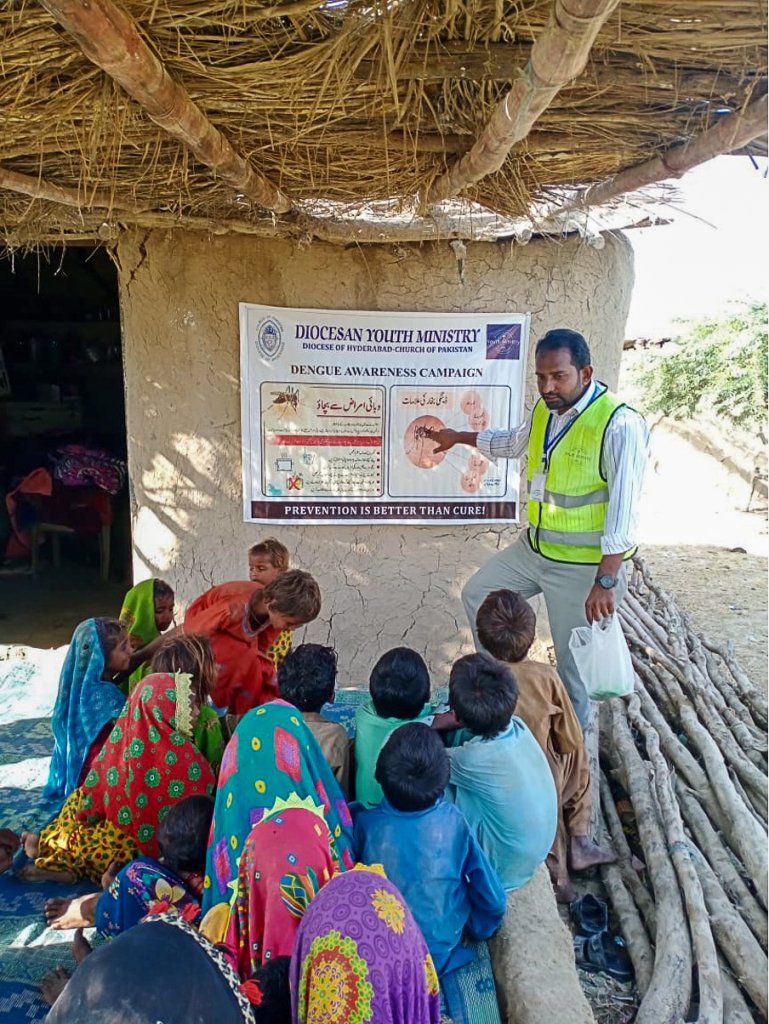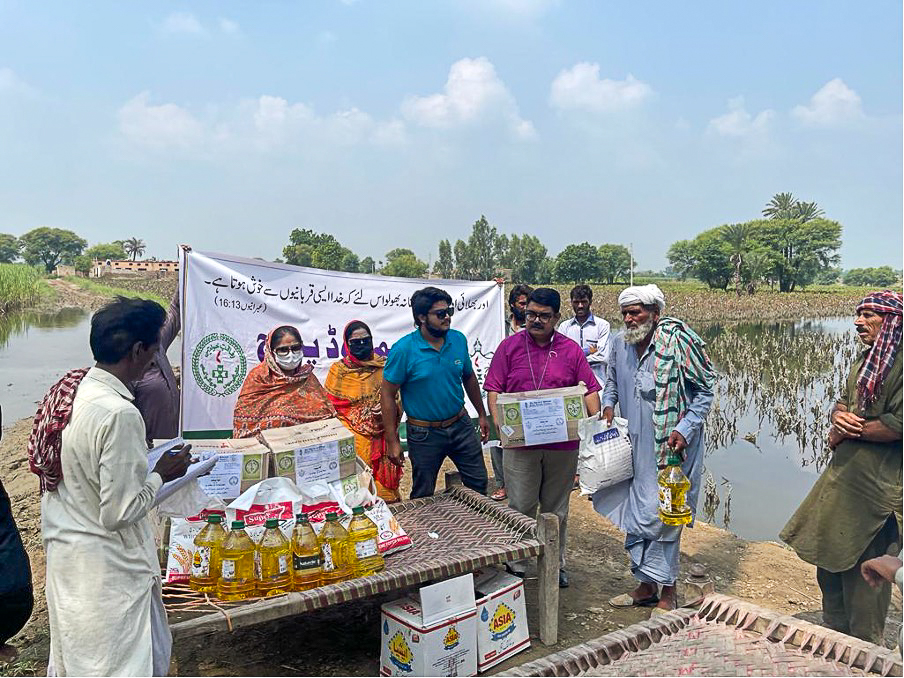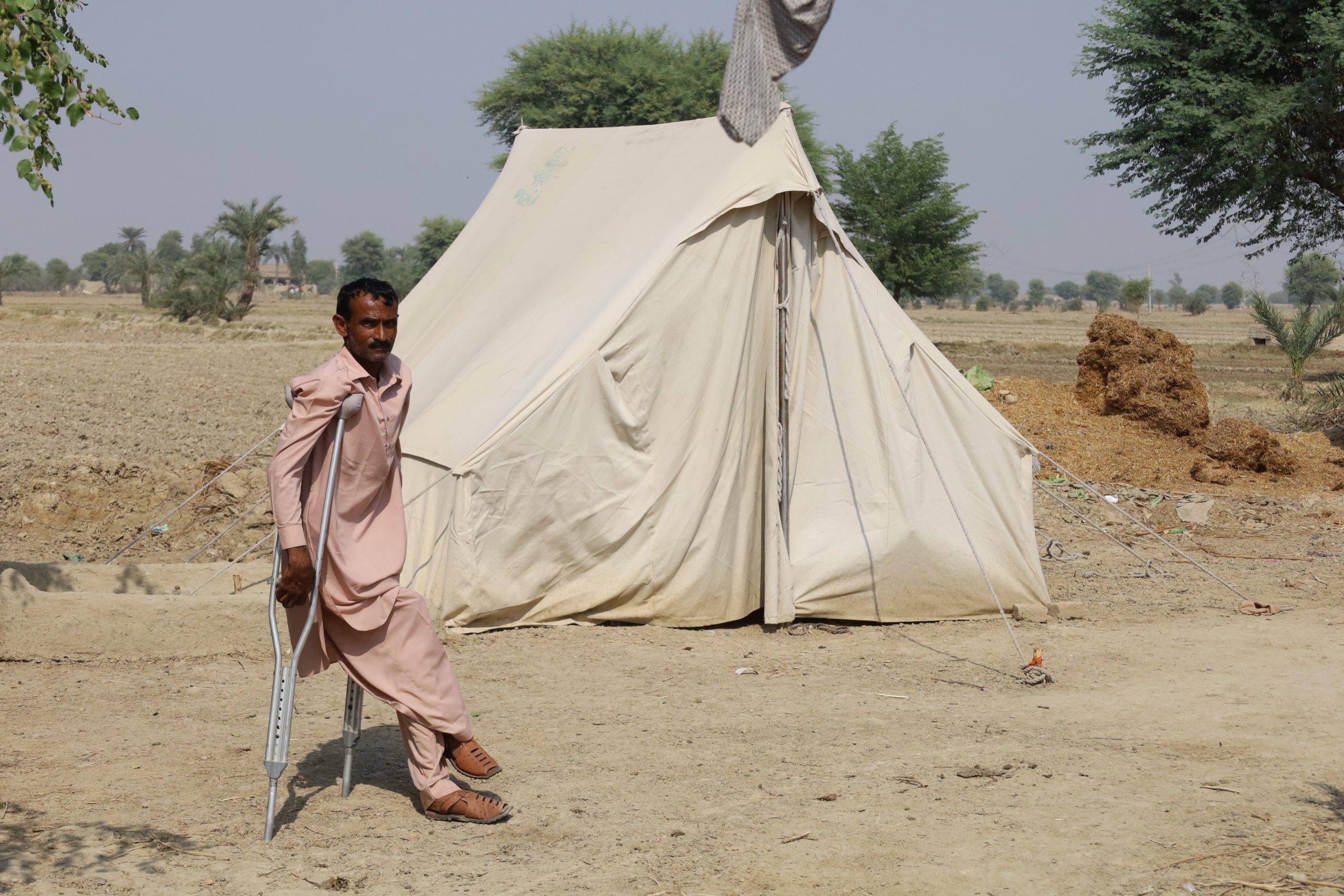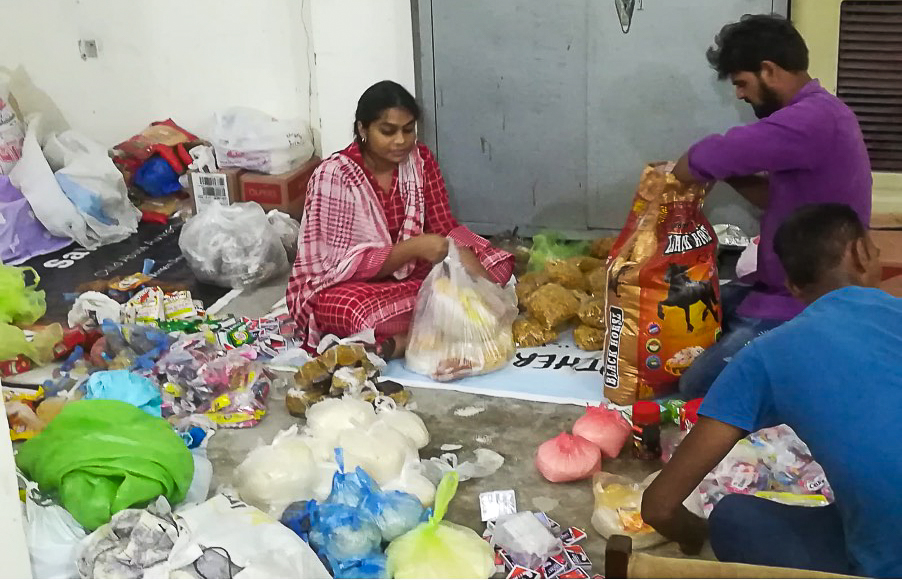Since the onset of an abnormal monsoon rainfall in Pakistan in mid-June, the global Anglican family has been praying and accompanying the Church of Pakistan (United) to respond to the humanitarian needs caused by the flood disaster.
Since mid-June, Pakistan has been receiving monsoon rainfall estimated to be three times the 30-year average. The abnormal rainfalls have caused the country’s worst flooding in decades, leaving unimaginably vast areas underwater. Eighty out of the 160 districts in the country have been declared calamity hit, with more than 33 million people impacted. The International Federation of Red Cross and Red Crescent Societies observes that the widespread flash floods continue to trigger waves of displacement in flood-affected districts where a surge of flood-borne diseases and food inaccessibility is on the rise.
According to the Pakistan National Disaster Management Authority (NDMA), over 1,695 people including 630 children have lost their lives and at least 12,865 people have been injured. Over 750,000 houses are fully destroyed, 1,277,861 partially destroyed and more than 1 million livestock killed as of 2 October 2022. More than 13,254 km of road, acres of land and 440 bridges have been reported damaged with 1,460 health facilities, 23,900 schools and many water systems rendered unfunctional. According to Red Cross and Red Crescent rapid needs analysis, preliminary data indicates high levels of damage to household, communal and institutional water and sanitation infrastructure. Health service delivery and immunisation services are disrupted, with the country experiencing a shortage of medicine availability and an increase in disease outbreaks including of cholera, dengue and measles.
The local church responds compassionately
When the floods hit, the local dioceses of the Church of Pakistan organised themselves to respond to the humanitarian needs occasioned by the disaster. The Diocese of Raiwind mobilized 30 churches, 10 schools and local friends, who contributed food items, cash donations, clothes, groceries, blankets, mats, bed sheets and medicines, among other things.
This initiative was coordinated by the Women Development Services (Diocese of Raiwind, Church of Pakistan), whose staff collected, sorted, purchased and packed the donations. On 29th September, the collected relief items were handed over to the Pakistan Army, to be distributed in the flood affected areas. The Most Revd. Dr. Azad Marshall, Bishop of Raiwind and Moderator of the Church of Pakistan, presided over a small prayer ceremony at the handover, which took place on the diocesan campus. Three fully loaded trucks were sent to the areas where people are suffering from hunger, cold and disease.
The Diocese of Hyderabad has also mobilised and distributed food and mosquito nets to 100 families in Kunri & Mithi, situated 280 kilometres away from Hyderabad. The distribution was done by the Diocesan Youth Ministry, who also continue to create awareness on dengue infection, prevention and management.

Youth of Hyderabad Diocese in the Church of Pakistan conduct a dengue awareness session in Kunri
Multan Diocese is equally involved in loving care for the affected families and communities in South Punjab which was also heavily hit by the ravaging floods. The Diocese, Women Desk-Multan Diocese and the Provincial Coordination Office (COP) are making collective efforts to support the affected people in D.G Khan, Rajanpur and Sadiqabad in Southern Punjab.
“Our youth, women fellowship, churches and Christian institutions are helping with their own resources to contribute in this critical situation of our country particularly in South Punjab,” said Bishop Leo Paul, Multan Diocese, Church of Pakistan.
By October, the Diocese had collected and distributed foodstuff to 100 affected families in Rajanpur and Sadiqabad.
The Diocese of Peshawar was requested by governmental agencies to support relief and reconstruction in three villages. They have since received support from Bridges to Pakistan, dedicated for flood relief and for the ministry of the Diocese which has been greatly impacted by the floods.

The Rt. Revd. Leo Rodrick Paul leads Multan Diocese workers in distributing foodstuff to flood victims in Rajanpur
The current situation
Despite these endeavours to respond to the flood situation, the magnitude of the disaster is so great that it is overwhelming the capacities of local responders. While many districts are experiencing stagnant or slow-receding water, floodwaters continue to rise in nine districts of Sindh, two districts of Baluchistan and one district in Punjab, further adding to the already 7.6 million people estimated to have been displaced by the floods. Authorities have warned that the water can take up to six months to completely recede – and as it does so, the magnitude of the damage becomes increasingly apparent.
The United Nations Office for the Coordination of Humanitarian Affairs (OCHA) is reporting that water-borne and vector-borne diseases are growing in Sindh and Baluchistan, where many districts remain flooded. An estimated 1.6 million women of reproductive age and around 130,000 pregnant women, urgently need healthcare facilities. Twenty eight districts have been assessed in the provinces of Sindh, Baluchistan and Khyber Pakhtunkhwa. It is estimated that 8.62 million people face food scarcity from September to November, 2022, including 5.74 million people in flooded districts.
The Bishop of Multan has reported that most of villages and cities have been disconnected from one another. He says, “The massive floods have resulted in killing hundreds of people in both our districts, besides washing out 3 tehsils [an administrative sub-division of a District] and 300 villages of D.G Khan, Rajanpur and Saidabad. People are suffering with shortage of food, medicines, clean drinking water and sanitations due to the closure of roads.”
The central coordinating office of the Church of Pakistan conducted an assessment of the prevailing situation in villages of Chak Kotla Rabaat, and Basti Dharpa Rakh of Fazilpur. The assessment established the huge economic impact the floods have had in the Province of Punjab which is largely based on agricultural activities. The region mostly grows cotton, wheat and tobacco. The production of these crops has now been affected as “the flood has made the land a bed of hard mudstones making it impossible to cultivate wheat in this season and residents have to wait a few months to get the land softened for cultivation,” reported Zaheer Abbas, Manager, Coordinating Office, Church of Pakistan.
The Diocese of Peshawar has also done an assessment of the situation in their region where in some areas, the whole infrastructure has been washed away, many people are still living in tents, while a few are residing with their relatives. People are anxiously waiting to return and reconstruct their lives. The Diocese has assessed the amount of the damage done in Charsadda, Tarnab, Risalpur, Nowshera, Jehingira, Akora, Khairabad and Hassan Gari (Peshawar). It estimates recovery to take up to $260,000.

Temporary shelter for flood victims.
Solidarity of the global Anglican Family
The impact of these unusual monsoon floods is clearly overwhelming, so, when the news of the flooding in Pakistan became headline news across the world, the global Anglican family began praying and sending messages of solidarity to brothers and sisters in Pakistan.
The Anglican Alliance shared news of the unfolding disaster on its social media channels and reached out both to the Church in Pakistan and to Anglican partners around the Communion, including United Society Partners in the Gospel (USPG), the Primate’s World Relief and Development Fund, Episcopal Relief & Development, and Anglican Board of Mission, Australia.
Together, these agencies have mobilised resources to support a response project designed by the Church of Pakistan coordinating office entitled ‘Emergency Disaster Relief and Support for Flood Victims in Pakistan’. The project intends to complement efforts by the Pakistani government and other humanitarian agencies providing support to the affected families. It will benefit 500 households (2500-3500 people) with food and non-food items for a period of two months in the Province of Punjab. The Anglican Alliance has co-ordinated this joint appeal, bringing the global partners into a proposal originally shared with USPG.
Links to partner appeals are at the end of this article.
Nicholas Pande, the Anglican Alliance’s Disaster Response and Resilience Adviser reflects on the wider picture and need for solidarity saying, “This calamity has laid bare the extremities of now very frequent weather events the world is facing due to changing climate. It is another compelling reason why we should accelerate climate action.”
Next steps in the journey
Anglican partners will continue to accompany the Church of Pakistan both in prayer and practical action. Once the project is implemented and communities set on the path to recovery, the Anglican Alliance will facilitate a partners’ call where the Church’s leadership will share about their experiences and any support needs. This will allow the Church to debrief after months of emergency response and to reflect with partners on what they have learned and their hopes for recovery.
Partners also hope to facilitate an in-person accompaniment visit to Pakistan at a time convenient for the Church. Please keep the families, communities, the Church and responders in your thoughts and prayers.
O God, our refuge and strength, our help in times of trouble. Have mercy on the lands damaged by floods. Have mercy on the lands where the weather has destroyed livelihoods. Protect those who evacuate houses, and strengthen those who rebuild hope so that entire communities may face the future without fear. Amen.
– Adapted from Psalm 46
Find out more about the partners reports and appeals on the following links:
PWRDF: https://pwrdf.org/federal-government-will-match-funds-donated-to-pakistan-relief/ Stories: https://pwrdf.org/pwrdf-supporting-food-assistance-in-flood-ravaged-pakistan/
Donation: https://interland3.donorperfect.net/weblink/WebLink.aspx?name=E344492QE&id=55
ERD: link for donations to International Disaster Response: https://www.episcopalrelief.org/what-you-can-do/give/donate-now/individual-donation/

